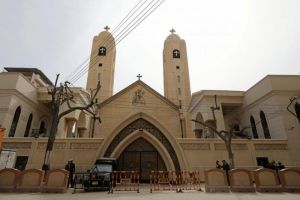World Evangelical Alliance 'expresses deep concerns' over Israel's West Bank annexation plans
International Christian Embassy Jerusalem says Israel has 'historic right and claim to Judea/Samaria'

One of the world’s largest networks of evangelical churches has expressed concerns over Israel’s plans to claim sovereignty over large areas of the West Bank, a territory that is home to millions of Palestinian Arabs and over 400,000 Jewish Israelis.
The World Evangelical Alliance, a global organization of evangelical churches that represents more than 600 million evangelicals worldwide, has joined a chorus of critics from across the globe who are speaking out against Israel’s plans to annex parts of the West Bank.

WEA issued a statement Tuesday saying that while the organization recognizes the right of “self-determination by any nation and the right of any nation to defend itself from harm,” WEA “expresses deep concerns over plans for Israel to annex large areas of the West Bank.”
Prime Minister Benjamin Netanyahu promised his supporters during his election campaign to extend Israel’s sovereignty over areas in West Bank, where Jewish settlements exist.
The West Bank, located between Israel and Jordan, was captured by Israel in the 1967 Six-Day War but was never fully annexed by Israel though it has been controlled by Israel for over 50 years.
Sovereignty over the West Bank as well as other regions conquered by Israel during the Six-Day War has long been debated in the international arena with most international actors opposing Israel’s plans to annex.
But under a deal that has led to the formation of the current Israeli government, the process to vote on annexation could begin as early as July 1.
“The unilateral move that will be voted on at the beginning of next month risks ending any hope for a negotiated peace agreement between the Israeli government and the Palestinian Authority,” WEA warned in its statement.
WEA General Secretary Bishop Efraim Tendero, an evangelical leader from the Philippines, stressed in a statement that WEA has members “representing both peoples.”
“[W]e seek and pray for peace and flourishing not only for our brothers and sisters in Christ in Israel and Palestine but for everyone who lives in the Holy Land,” Tendero said.
Tendero called for a “renewed commitment to negotiations where both sides respect each other’s existence and the needs of both peoples.” Tendero also called for an approach that refrains from discrimination and violence and “work in good faith toward solutions that will bring lasting peace.”
“While evangelicals around the world have wide-ranging views on the many complex issues in the Holy Land, there is no doubt that the proposed annexation plans are detrimental for Israelis and Palestinians alike, so we clearly oppose such plans,” Tendero said.
In January, President Donald Trump rolled out what he called a “deal of the century” with Isreal that includes the annexation of parts of the West Bank.
The deal had been in development since 2017 and included 50 pages of the Trump administration’s ideas about how to resolve Israel’s border disputes.
The plan sought Israeli sovereignty over Jerusalem and would give Palestinians control over some neighborhoods in the outskirts of Jerusalem and about 70% to 80% control of the West Bank, The Wall Street Journal reported at the time.
Netanyahu pledged that Israel would annex much of the Jordan Valley, encircling a future Palestinian state. Trump administration officials said the plan would not require either Palestinians or Israelis to leave their homes.
Trump called the deal “a historic opportunity for the Palestinians to finally achieve an independent state of their very own."
Trump’s plan was praised by conservative evangelical leaders. Mike Evans, a Christian Zionist author who has informally advised the Trump administration, has supported the “sovereignty plan.”
Evans, the founder of the Friends of Zion Museum in Jerusalem, told i24News in an interview that “all of the accomplishments” in Israel in the last three-and-a-half years have happened thanks to the support from evangelicals in the U.S.
“There's three-quarters of a billion evangelicals who believe this is the Bible land, and that the Bible is not illegal,” Evans said.
Evans also shot down the notion that Israel’s plans in the West Bank are “annexation plans.”
“There are two issues that people are trying to tie together. They are trying to tie together the sovereignty issue with the peace plan. You can’t,” he said. “You can’t tie those together."
“We evangelicals want the president to come out strong and say, ‘The Bible is not illegal’ and this is the Bible land,'" Evans continued. "It’s no big surprise to people how we feel. We feel very strongly about that.”
International Christian Embassy Jerusalem, a Zionist organization, said in a statement earlier this month that the term “annexation” is “a misnomer.”
“It commonly denotes the forcible taking of the territory of another. But here, Israel already held a legitimate historic right and claim to Judea/Samaria even before it came into possession of these areas in an act of self-defense in 1967,” the statement reads. “The question now facing Israel is whether to fully assert its sovereign title to certain of these territories by simply extending its laws there.”
The Associated Press reported that Whtie House aides have not been able to decide on whether to support Israel's plans.
On Wednesday, Secretary of State Mike Pompeo criticized the Palestinian Authority for not participating in the negotiation process.
“They simply have rejected this out of hand. We simply asked that they come to the negotiating table based on what’s outlined in the Vision for Peace, and they have chosen not to,” Pompeo told reporters. “They have chosen to threaten, to bluster, to assert that they’re going to deny the ability to do security — that’s not good for the Palestinian people. It’s dangerous for the people that live in those places too.”
Follow Samuel Smith on Twitter: @IamSamSmith
or Facebook: SamuelSmithCP



























